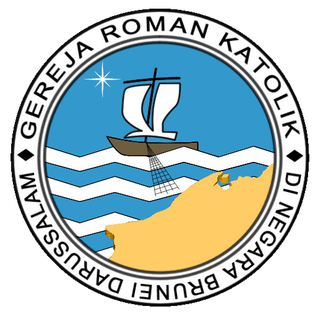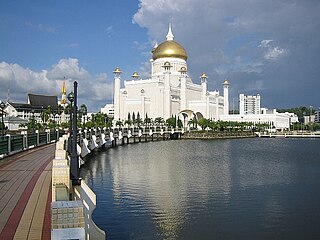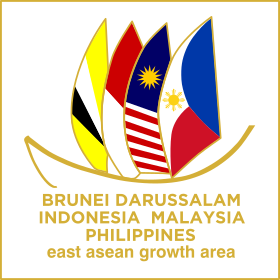
Brunei, officially the Nation of Brunei, the Abode of Peace, is a country located on the north coast of the island of Borneo in Southeast Asia. Apart from its coastline with the South China Sea, the country is completely surrounded by the insular Malaysian state of Sarawak. It is separated into two parts by the Sarawak district of Limbang. Brunei is the only sovereign state completely on the island of Borneo; the remainder of the island's territory is divided between the nations of Malaysia and Indonesia. Brunei's population was 428,963 in 2018.

Brunei joined ASEAN on 7 January 1984, one week after resuming full independence, and gives its ASEAN membership the highest priority in its foreign relations. Brunei joined the United Nations in September 1984. It also is a member of the Organisation of Islamic Cooperation (OIC), the Asia-Pacific Economic Cooperation (APEC) forum and the Commonwealth of Nations. Brunei hosted the APEC Economic Leaders' Meeting in November 2000. In 2005 it attended the inaugural East Asia Summit.

Bandar Seri Begawan is the capital city of the Sultanate of Brunei. It is officially governed as a municipality. Bandar Seri Begawan has an estimated population of 100,700, and including the whole Brunei-Muara District, the metro area has an estimated population of 279,924.

Royal Brunei (RB) Airlines Sdn Bhd is the national flag carrier airline of Brunei Darussalam, headquartered in the RB Campus in Bandar Seri Begawan. It is wholly owned by the government of Brunei. Its hub is Brunei International Airport in Berakas, just to the north of Bandar Seri Begawan, the capital of Brunei.

Brunei-Muara is the northernmost district in Brunei. It is the smallest of Brunei's four districts in terms of area but by far the most populous, containing over half the country's population. It is the most important and bustling district because the capital, Bandar Seri Begawan which is also the state capital, is the seat of the government ministries and departmental headquarters as well as the centre of business activities. Other major towns in the Brunei-Muara district include Muara town. The Brunei-Muara district houses the largest and deepest port in Brunei, the Muara Port.

Tawau Airport is an airport located 15 nautical miles north east of Tawau, Sabah, Malaysia. It is one of two airports in Sabah with immigration counters for international flights, the other being Kota Kinabalu International Airport. Tawau Airport serves the districts of Tawau, Kunak and Semporna and is the nearest airport to the diving islands of Sipadan, Mabul and Kapalai, all of which are located in the latter district.

The Apostolic Vicariate of Brunei Darussalam is a Roman Catholic ecclesiastical jurisdiction covering the territory of Brunei and headed by an apostolic vicar, currently by Cornelius Sim.
Borneo Airways is the name of two former airlines. The first, Borneo Airways Limited, was based in British Borneo and was active in the 1950s and until 1965. Borneo Airways was in operation during 1997–1999 in Brunei.
Mosphil Aero was an airline based in Makati City, Manila, Philippines. It operated domestic passenger and cargo services around the southern Philippines, primarily from Zamboanga International Airport.
MASwings Sdn Bhd is a regional airline operating the Rural Air Services (RAS) in East Malaysia. It took over the RAS previously operated by FlyAsianXpress. The first flight was on 1 October 2007, which is also the anniversary of the founding of Malaysia Airlines in 1972. Its headquarters are located in MAS/MASwings Administration Building, Kota Kinabalu International Airport, Sabah. Previously its head office was located in the Beautiful Jade Centre in Miri.

Brunei–Malaysia relations are foreign relations between Brunei and Malaysia. Brunei has a high commission in Kuala Lumpur, as well as consulate-generals in Kota Kinabalu and Kuching. Malaysia maintains a high commission in Bandar Seri Begawan. Both countries are full members of ASEAN and the Commonwealth of Nations. The two countries share a land border on the island of Borneo.
Romeo Mencidor Montenegro devoted most of his career in pursuing sustainable peace and economic development in the island-region of Mindanao in Southern Philippines. He is currently serving as Director for Investment Promotion and Public Affairs Office of the Mindanao Development Authority (MinDA), a government body with principal mandate to integrate the socioeconomic development of Mindanao and serves as the Philippine Coordinating Office for the Brunei Darussalam-Indonesia-Malaysia-the Philippines-East ASEAN Growth Area BIMP-EAGA. He is married to Venus Alcomendras, with whom he has a son named Juan Carlos.
The BIMP-EAGA Friendship Games is a sporting biennial event between the regions of the four member countries of the BIMP-EAGA. The inaugural edition of the games took place in General Santos, Mindanao, Philippines from 25–27 April 1996.

Tourism in Brunei is governed by the Ministry of Primary Resources and Tourism, which is planning to diversify Brunei's tourism to include adventure tourism, ecotourism and Islamic tourism.
DAMRI or Djawatan Angkoetan Motor Repoeblik Indonesia is an Indonesian state-owned public transit bus company. It offers transit routes to and from major airports in the country, including Soekarno–Hatta International Airport. It also operates intercity buses and some transborder routes into neighboring nations. It also operates three routes of the TransJakarta busway.
Djawatan Angkoetan Motor Repoeblik Indonesia or DAMRI is an Indonesian state-owned company that was formed based on Ministry of Transportation notice RI No.01/DAMRI/46 dated 25 November 1946 with a main duty to carry out passenger and cargo transport on the road using motorized vehicles. Under further development as a public company, the name DAMRI is still used as a brand mark of this state-owned company that is still consistently doing its duty to carry out passenger and cargo transport using buses and trucks.
The ASEAN Smart Cities Network (ASCN) is a collaborative platform which aims to synergise Smart city development efforts across ASEAN by facilitating cooperation on smart city development, catalysing bankable projects with the private sector, and securing funding and support from ASEAN's external partners. It was launched at the 32nd ASEAN Summit as a key deliverable of Singapore's ASEAN Chairmanship 2018. The Inaugural Meeting of the ASCN took place on 8 July 2018.
Sabah Trade Centre is a trade centre building in Kota Kinabalu, Sabah, Malaysia. The building located at an approximately 100,000 square feet area reaching the height of 70 feet and divided into two levels. It is managed by Sabah Trade and Industry Consultancy Sdn. Bhd. (STIC), under the State Department of Industrial Development and Research, Ministry of Industrial Development of the Government of Sabah.














